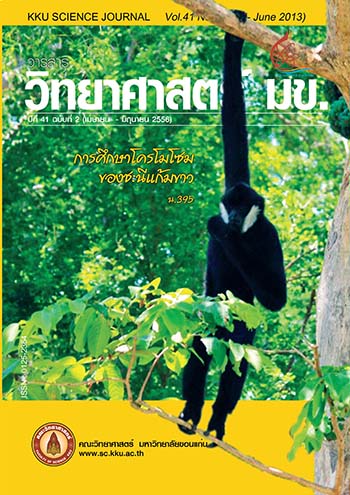Uptake of Zinc, Lead, and Copper by Sunflower Grown in Contaminated Soil
Main Article Content
Abstract
This research is a study of the metal-uptake of Pacific sunflower sp.77, grown in soil contaminated with lead, 550 mg/kg, 140 mg/kg zinc and 350 mg/kg copper and the influence of salt ((NH4) 2SO4, NH4NO3, and EDTA) to the uptake. The soil (sandy loam) used in this study came from the province of Nakhon-Ratchasima. The dominant feature of Pacific sp.77 sunflower is the condensed seed in the flower head and a high percentage of oil in the seed. The harvest time is about 90 days after seeding. The heavy metals were determined in roots, stems, leaves and seeds of the sunflower. The sunflowers were seeded in pots and conducted using a Completely Randomized Design with three-time replication. The results showed that without the salt addition, lead, copper and zinc were absorbed by the sunflowers of 29.91, 45.50 and 100.70 mg /kg of the plant weight. Moreover, the addition of NH4NO3 and (NH4)2SO4 increased the uptake of all kind of metal, highest by the NH4NO3 addition.In addition, total amount of lead in all treated
plants were beyond the food standard, but the amount of copper and zinc were in the standard.
Article Details

This work is licensed under a Creative Commons Attribution-NonCommercial-NoDerivatives 4.0 International License.


